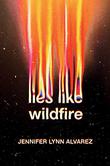Considering how quickly wildfires can consume Californian consciousness, it’s no surprise they took over Jennifer Lynn Alvarez’s writing process as well.
The author of the tween fantasy trilogy Riders of the Realm and The Guardian Herd series knew she wanted to write about a group of friends who just graduated from high school.
“They have their whole lives ahead of them and they’ve worked so hard,” said Alvarez, calling from her home in Sonoma County, California. “Then, they make this horrible mistake. That’s how it started when I sat down and started writing. But I didn’t know yet what the mistake would be.”
She was hiking at a park near her house in 2019, about two years after the Tubbs Fire caused $1.2 billion in damage to her community, when it hit her: “They were going to start a wildfire.”
The result is Lies Like Wildfire (Delacorte Press, Sept. 7), a fast-paced page-turner about what happens when teen friends accidentally start a wildfire and how the lies start compounding after you decide not to tell the truth.
Alvarez took a break from working on her next project to talk about how much she enjoyed writing her first YA thriller. The conversation has been edited for length and clarity.
The way you write about the wildfire is so vivid and detailed, it’s clearly from personal experience. How did you decide to make it the backdrop of your story?
I have to say this book wrote me.…When it came to me that they were going to start a wildfire, the whole story took off from there, and I felt like my fingers started to tingle and the story just bloomed. And as I researched the laws around wildfires, I saw that even accidentally starting one is criminal, so I knew then the stakes were going to be high enough for this group of kids to lie. This was around the time of the Varsity Blues scandal as well. There’s all this pressure on these teens to graduate, plus felony charges and feeling despised by your entire town and burning down your high school. It was just natural that they would want to hide this.
These teens are not bad people. They just got caught up in a bad situation. Why did you want to examine that dynamic?
It’s like having empathy for people when they make mistakes and realizing most people don’t want to do bad things. But people do bad things all the time, and I like exploring that—getting into the point of view of the so-called villain and finding out why they take it so far. I do feel like you’re always the hero of your own story. You’re trying to save your own life, or you’re trying to protect your parents from finding out you burned down your own house. I’m fascinated, technically, by the villain or the antihero in stories, trying to figure out what makes them tick.
By showing readers that, what would you like them to take away from the story?
You can’t grow unless you face your mistakes. But it’s also a cautionary tale. This is what happens when you can’t let go and you can’t face the truth. When you can’t admit what you did, it’s just one disaster after another.
Is this the start of another series or a stand-alone story?
This is a stand-alone. But I do have a second thriller, which will also be set in Northern California in a fictional beach town. It’s another teen thriller, but unrelated to this one, coming out next year.
So you’re sticking with teen thrillers for a while.
 Honestly, I feel like my attention span is not what it used to be since I got a smartphone. I just find that thrillers keep me turning the pages because there’s a little bit of mystery and suspense. I’ve tried writing adult books—and I still want to try again—but I just have a younger voice as my writing voice. I think it’s because I just love a coming-of-age story. Everything’s bigger, brighter, and more intense. When you combine real big life experiences with no life experience, it’s kind of a perfect storm for learning about yourself and growing. It’s about making those mistakes but hopefully learning from them, too.
Honestly, I feel like my attention span is not what it used to be since I got a smartphone. I just find that thrillers keep me turning the pages because there’s a little bit of mystery and suspense. I’ve tried writing adult books—and I still want to try again—but I just have a younger voice as my writing voice. I think it’s because I just love a coming-of-age story. Everything’s bigger, brighter, and more intense. When you combine real big life experiences with no life experience, it’s kind of a perfect storm for learning about yourself and growing. It’s about making those mistakes but hopefully learning from them, too.
It’s part of the power of reading that so many things happen at once.
What kids would learn if they did slow down and really curl up with a book is that it is more immersive than the smartphone. They are actually in the heads of these characters. The more you read, the better you get at it, the more it becomes a movie in your head. You’re there, and not a passive observer, painting [the author’s] picture inside your brain.
It’s a collaboration in a way.
You’re getting all these clues from the writer, but you’re filling in all the blanks yourself. So if you want to be a creative person, it’s going to help with your creativity. It’s going to inspire you, and it’s going to sit with you deeper than these videos that you might forget a few minutes later. These books can sit with you your whole life, and they generally teach you things about the world, even if they’re there to entertain you.
Glenn Gamboa is a writer in Brooklyn.


































